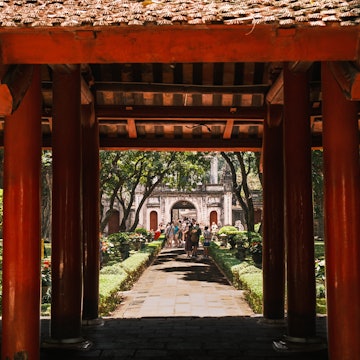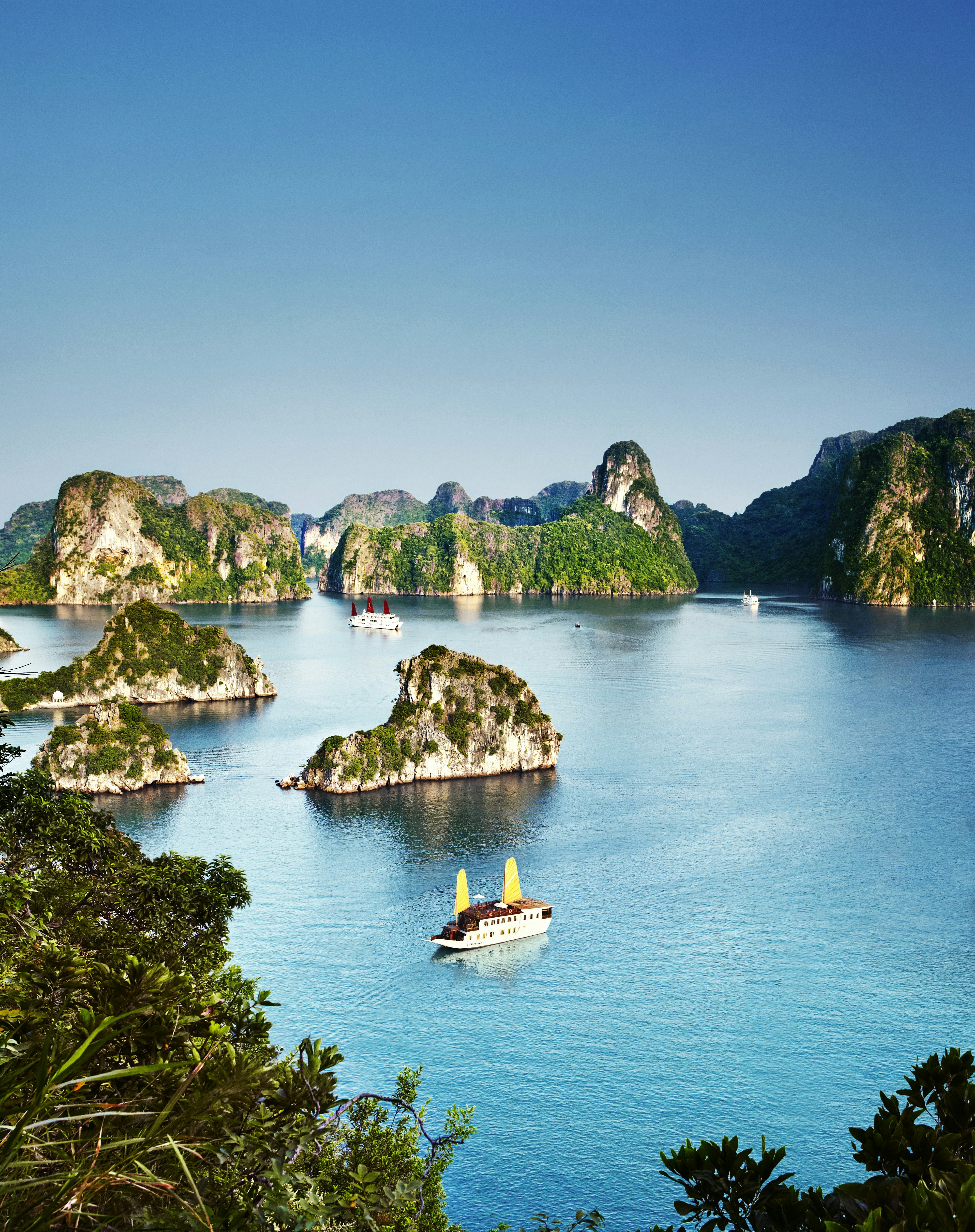

Boats tour Halong Bay, one of Southeast Asia's most popular attractions. Digitaler Lumpensammler / Getty Images
Dotted with jagged limestone pinnacles, Halong Bay is one of Vietnam’s biggest attractions. The vast majority of its 10 million visitors a year arrive aboard day and overnight cruises.
The multitude of trips on offer can be overwhelming: here’s the skinny on Halong Bay to get you started.

Make the most of your visit
Halong Bay retains much of the otherworldly magic conjured up by 1969 jungle-clad islands and islets rising from deep emerald waters. Getting there is increasingly straightforward, thanks to the 2018 building of an expressway connecting Halong City and Hanoi, and the opening of Van Don International Airport (with flights to Ho Chi Minh City, and international flights coming soon) a mere 50km from Halong Bay.
But the bay's popularity has taken its toll. Concerned about overcrowding, water pollution and litter, the Vietnamese government has imposed strict regulations.
Today, boats must follow one of five prescribed routes through the bay, meaning overnight cruises leaving roughly from the same place at the same time play follow-the-leader as they hit the major highlights of the bay almost in frustrating concert. In addition, swimming is only allowed at a few designated beaches, with drones surveilling the skies to make sure boat captains comply.
Especially with these rules in place, your choice of cruise can make or break your Halong Bay experience.
Luxury cruises
Want to spoil yourself? Halong Bay has some sumptuous cruise options that are basically luxury hotels on water. You’re paying for the experience of five-star amenities here – not for any particular divergence from the typical cruise itinerary – but if you want to live it up from a swanky sun-lounger while watching the sun set over a vista of craggy jungle-topped islands, you can’t really go wrong.
For a luxury cruise, bank on spending around US$300–350 for a cabin.
Pros: It’s a serious treat. While the cost may seem high, it typically includes higher quality meals and amenities on board, such as a spa or gym, as well as entry to Halong Bay.
Cons: Those who are after good value should probably look at midrange options. Overnight trips (marketed as two-day/one-night trips) usually involve 24 hours or less on the actual boat, which can rankle given what you pay for the experience.

Budget and midrange cruises
Most Halong Bay visitors go for midrange or budget cruises, but there is a huge range when it comes to price and value for money. At one end of the scale are some ultra-budget boats where conditions are rustic at best; at the other are some excellent midrange options offering cosy hotel-style cabins, knowledgeable on-board tour guides and kayaking stops. If purse strings are tight, for facilities, comfort and safety considerations, it’s sometimes better to choose a day cruise with a midrange operator rather than a bargain-basement overnight trip.
Budget cruise prices start from US$60 per person for a day trip. Paying between US$110 and US$130 should get you a worthwhile overnight midrange cruise.
Pros: Competition is fierce, which means plenty of operators add freebies into the itinerary, such as kayaking and private minibus transfers from Hanoi.
Cons: You have to wade through a lot of options, which can be confusing. It’s worth doing your pre-trip research.
Day cruises
If you’re pressed for time, do as many locals do and see Halong Bay on a day cruise from Tuan Chau Marina in Halong City. Cruise boats can be rented by the hour (around US$30 per hour for a boat that accommodates up to 20 passengers) or you can join other passengers aboard a four- to six-hour cruise for about US$50 per person. Options vary greatly, so check whether the price includes lunch.
Pros: Day cruises are cheap and easily organised tours right on the spot in Halong City, plus there’s free entertainment on board provided by karaoke.
Cons: Can be crowded and noisy, with only time enough for a few stops. Did we mention the karaoke?

Kayaking
Most decent midrange Halong Bay cruises will offer an hour or so of kayaking (some charging an extra fee). Paddling around the karsts allows you to experience the limestone towers from a completely different angle: up close and without the constant thrum of an engine in the background.
For more experienced kayakers, there are also kayak-only trips. These trips are run by a handful of operators based in nearby Lan Ha Bay (off Cat Ba Island) rather than Halong Bay itself, though Lan Ha’s islet-scattered sea has as much wow factor as Halong Bay and is much less visited.
Full-day kayaking trips from Cat Ba Island cost between US$25 and US$30 per person.
Pros: In one of Southeast Asia’s most popular tourist destinations, a kayak trip is a way of escaping the crowds.
Cons: On a full kayaking tour, you’re only going to see a sliver of the area. To see more, it’s a better idea to take a cruise that includes a kayaking stop.
Safety
One of the most important reasons to steer away from the ultra-budget cruises is safety. After a boat sinking (and the loss of 12 lives) in 2011, new safety regulations were brought in for Halong Bay cruise boats, but scrimping on safety does still go on with some fly-by-night operators.
In particular, check that any kayaking stops are accompanied by a guide. Because of the variable and surprisingly strong currents close to the karst islands, a safety-conscious operator won’t allow kayakers to paddle off from the boat by themselves.

Booking tips
Most trips leave from Hanoi, but you can also base yourself in Halong City. When you're booking, bear these tips in mind:
The Halong Bay entry fee is US$13 per person for a day cruise and US$25 for an overnight cruise. This is generally included in your ticket, though it's worth double-checking for the cheapest cruises. Activities like kayaking and island bike rides may cost extra.
When comparing prices, check whether a transfers between Hanoi and Halong Bay are included, and if so, whether it’s one-way or round-trip, and if it uses the new expressway or not.
While the Ha Long–Hai Phong Expressway has cut travel time between Hanoi and Halong Bay to 2½ hours, that really only applies to private vehicles which don’t stop to pick up any other passengers and which don’t make the usual 30-minute comfort stop halfway through the journey. Aboard a shuttle bus, plan for a three to 3½-hour ride.
Check closely to see whether overnight cruise rates are priced by cabin or by person. Single travellers should expect to pay 70-80% of the full cabin price.
The itinerary on a one-night cruise can be very packed, with shore excursions, kayaking, swimming and hiking all included, leaving little time to actually just sit and watch the amazing scenery during daylight hours. If you have the time, a two-night itinerary is much more leisurely, with the bonus of visiting sights with fewer people around.

Arranging a tour
Some recommended operators:
Vega Travel offers good-value overnight and two-night tours with comfortable cabins, and kayaking included. Highly recommended by travellers.
Cat Ba Ventures runs tours out of Cat Ba Island, taking in both Halong Bay and Lan Ha Bay.
Indochina Sails has a traditional Chinese junk that’s been fully fitted out with all mod cons.
Handspan Adventure Travel has a proper sailing ship, so you don’t have to put up with that pesky engine hum. Handspan also runs full kayaking tours in nearby Lan Ha Bay.
Hai Au Aviation offers Vietnam’s only seaplane flights, including a 25-minute scenic flight over Halong Bay which presents a completely different perspective. From the air, the islands truly do resemble the undulating body of a dragon, the meaning of 'Halong'.
L’Azalée Private Premium Cruise has the bay’s only single-cabin cruiser for an ultra-luxe experience, but expect to pay dearly for the privilege.
When to go
One of the best times to visit Halong Bay is November – there are blue skies aplenty, temperatures are moderate and there’s a good chance of calm seas. From May to September, tropical storms can whip up without much warning. This is also high season in Halong, particularly from June to mid-August when domestic tourism peaks.
February to April is often cool and drizzly, and the fog can make visibility low, though also adds an ethereal atmosphere. Year-round, cruises and tourist boats sometimes need to alter their itineraries, or trips can be cancelled with little warning depending on the weather and sea conditions. If you’re booking a cruise, check the fine print for the refund procedures.















